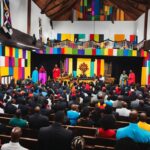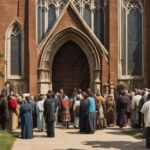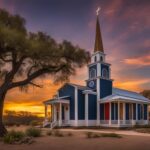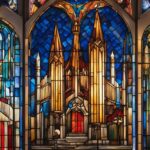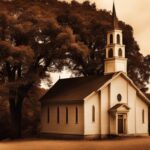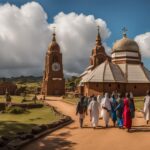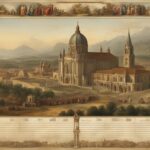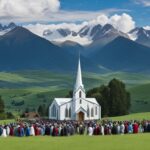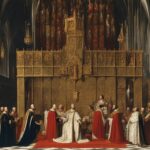Welcome to our in-depth exploration of the fascinating history of Zion Church. Founded in 1796 in New York City by African Americans, Zion Church has played a significant role in shaping the religious landscape of the United States. From its origins to its current global influence, this article will delve into the key aspects of Zion Church’s history, beliefs, governance, worship practices, and more. Join us as we uncover the rich tapestry of this iconic institution.
Key Takeaways:
- Zion Church was founded in 1796 in New York City by African Americans, establishing a separate religious body for black worshipers.
- The church shares many beliefs with Methodism and emphasizes social justice and the fight against racial inequality.
- Zion Church holds historical significance as the oldest African-American church in many cities and played a crucial role in the civil rights movement.
- The church has experienced denominational splits and schisms but has maintained a strong presence.
- Zion Church follows a hierarchical structure of leadership and governance based on democratic principles.
Origins and Founders of Zion Church
Zion Church, founded in 1796 in New York City, has a rich history and stands as an important institution in the African-American religious landscape. The church was established by African Americans as a separate religious body to provide a platform for black worshipers and promote brotherly love and equality among Christian followers. The founding members had a vision of creating a space where race or caste would not hinder their religious fellowship.
“We saw the need for a church that would provide a sanctuary for black worshippers and embody the principles of love, equality, and justice,” said one of the founding members, whose name is lost to history.
The founding of Zion Church was a significant milestone in the fight against racial inequality and discrimination. It offered African Americans a space to worship freely and express their faith without the constraints imposed by a racially divided society. The church quickly gained a reputation for its welcoming atmosphere and its commitment to uplifting the African-American community.
While the specific names of the founders may be lost to time, their legacy lives on through Zion Church and its continued mission of fostering spiritual growth, social justice, and community development.
Key Beliefs and Doctrines of Zion Church
Zion Church, as part of the African Methodist Episcopal Zion denomination, upholds a set of key beliefs and doctrines that shape its theological framework. These beliefs align with the broader tenets of Methodism, emphasizing the importance of God’s grace, salvation through Christ, and the authority of the Bible.
“We believe in one God, the Father Almighty, maker of heaven and earth, and of all things visible and invisible,”
states the Zion Church’s Statement of Beliefs. This foundational belief in the unity and sovereignty of God forms the basis of their faith. The church also believes in the Holy Trinity, consisting of God the Father, God the Son (Jesus Christ), and God the Holy Spirit.
Central to Zion Church’s doctrine is the belief in salvation through faith in Jesus Christ. They affirm that through repentance, acceptance of Jesus as Savior, and the transformative power of the Holy Spirit, believers can experience forgiveness of sins and eternal life.
Additionally, Zion Church places great emphasis on social justice and the fight against racial inequality. Inspired by the teachings and example of Jesus Christ, they actively promote equal rights and advocate for the marginalized and oppressed. This commitment to justice aligns with the church’s historical significance as a symbol of strength and empowerment for the African-American community.
The Table of Key Beliefs and Doctrines in Zion Church
| Beliefs | Doctrines |
|---|---|
| Belief in one God, the Father Almighty | Salvation through faith in Jesus Christ |
| Belief in the Holy Trinity | Authority of the Bible |
| Commitment to social justice | Fight against racial inequality |
The beliefs and doctrines of Zion Church provide a strong foundation for its members, guiding their faith and shaping their actions. By incorporating these principles into their worship and daily lives, members of Zion Church strive to live out their commitment to God, their community, and the pursuit of justice.
Historical Significance of Zion Church
Zion Church holds immense historical significance, marking its place as the oldest African-American church in several cities, including New York City and Montgomery. Since its founding in 1796, the church has been a beacon of hope and resilience for the African-American community, especially during times of slavery and discrimination. Throughout history, Zion Church has been an integral part of the civil rights movement, providing a platform for advocacy and equal rights for all.
The church’s historical milestones include being a driving force in the fight against racial inequality and injustice. It played a significant role in organizing protests, marches, and influential campaigns that helped shape the course of civil rights in the United States. The courage and determination of Zion Church members have left an indelible mark on the nation’s history and continue to inspire generations to stand up for justice.
“Zion Church’s historical significance extends beyond its religious influence. It symbolizes the resilience and strength of the African-American community, serving as a testament to the power of faith in overcoming adversity.” – Dr. Angela Jackson, Historian
Moreover, Zion Church has been a catalyst for positive change in communities, fostering education, healthcare, and social welfare programs. From establishing schools and orphanages to advocating for equality in employment and voting rights, the church’s impact extends far beyond its religious practices. It continues to be a force for social justice, not only within its congregations but also in the broader society.
Table: Historical Milestones of Zion Church
| Year | Event |
|---|---|
| 1796 | Foundation of Zion Church in New York City |
| 1830 | Zion Church becomes a hub for abolitionist activities |
| 1866 | Participation of Zion Church members in the Freedmen’s Bureau and Reconstruction efforts |
| 1955 | Active involvement of Zion Church leaders and members in the Montgomery Bus Boycott |
| 1968 | Foundation of the Martin Luther King Jr. Memorial Garden at Zion Church |
| 2008 | Recognition of Zion Church as a National Historic Landmark |
The historical significance of Zion Church cannot be overstated. Its impact on the African-American community and its pivotal role in the civil rights movement have solidified its place in American history. Today, the church continues to inspire individuals to work towards achieving equality and justice for all.
Denominational Split or Schisms in Zion Church
Zion Church, like many religious organizations, has experienced denominational splits and schisms throughout its history. These divisions have arisen due to various factors, including theological disagreements, differences in governance, and social issues. While these splits have presented challenges, the church has consistently demonstrated resilience, adaptability, and a commitment to its core values.
One significant schism in Zion Church occurred in the mid-19th century, leading to the formation of the African Methodist Episcopal Church (AME Church). The split was primarily driven by the issue of racial segregation within the church. Some members believed in the importance of maintaining a separate church body to address the unique needs of African Americans, while others advocated for integration with predominantly white denominations. This division ultimately led to the creation of two distinct African-American Methodist denominations, each with its own institutional structures and traditions.
Another notable split in Zion Church’s history took place in the early 20th century and resulted in the formation of the African Methodist Episcopal Zion Church. This divide was influenced by theological disagreements and differences in governance. The newly formed denomination sought to prioritize African-American leadership and decision-making processes, while maintaining a strong commitment to traditional Methodist beliefs and practices.
Table: Major Denominational Splits in Zion Church
| Schism | Year | Reason |
|---|---|---|
| African Methodist Episcopal Church (AME Church) Split | 1816 | Racial segregation within the church |
| African Methodist Episcopal Zion Church Split | 1821 | Theological disagreements and differences in governance |
Despite these splits, Zion Church has remained steadfast in its mission and has continued to thrive as a significant African-American denomination. The church has focused on promoting racial equality, social justice, and community development. Today, Zion Church serves as a beacon of hope and inspiration for its members, playing a vital role in empowering the African-American community and beyond.
Leadership and Governance of Zion Church
Zion Church follows a hierarchical structure of leadership, with bishops overseeing the church at a national and international level. The church also has pastors and local leaders who help guide its congregations. Governance is based on democratic principles, with decision-making processes involving both clergy and laity.
The Hierarchical Structure of Leadership
Zion Church operates under a hierarchical system of leadership, with bishops serving as the highest-ranking officials. The bishops provide oversight and guidance to the church at a national and international level. They play a crucial role in shaping the direction of the church and ensuring its adherence to core beliefs and values.
Below the bishops, there are pastors who lead individual congregations. These pastors are responsible for the day-to-day operations of their churches, including conducting worship services, providing spiritual guidance, and overseeing various ministries and activities.
Governance and Decision-Making
Zion Church embraces a democratic form of governance, which means that decision-making processes involve both clergy and laity. The church values the input and participation of its members in determining key policies and initiatives.
Important decisions are typically made through a combination of consensus-building, voting, and consultations. This ensures that the voices of the entire church community are heard and considered.
Empowering the Local Congregations
While the church has a hierarchical structure, there is also a strong emphasis on empowering local congregations. Each congregation has its own unique leadership team, comprising of pastors, deacons, and other church members who take on various roles and responsibilities.
This decentralized approach to leadership allows for greater flexibility and adaptability in meeting the specific needs and challenges of each congregation. It also encourages active participation and engagement from church members, fostering a sense of ownership and community spirit.
Worship Practices in Zion Church
Zion Church, rooted in the traditions of African Methodism, embraces a vibrant worship style that encompasses both reverence and joy. The church’s worship practices are deeply influenced by Methodist traditions, emphasizing hymns, prayer, and preaching as integral components of the worship experience. Music plays a central role in Zion Church services, with soulful melodies and harmonies filling the sanctuary and stirring the hearts of worshipers.

During services, congregants actively participate in communal prayer, lifting their voices together in devotion and seeking guidance from a higher power. The preaching at Zion Church is a dynamic and energetic affair, with pastors delivering impassioned sermons that inspire and challenge attendees. These sermons often touch on themes of social justice, equality, and the promotion of a more inclusive society.
Community engagement is an essential aspect of worship at Zion Church. In addition to regular services, the church organizes various outreach programs and initiatives aimed at addressing social issues and uplifting marginalized communities. These activities reflect the church’s commitment to putting their faith into action and embodying the teachings of Jesus Christ.
Examples of Zion Church Worship Practices:
- Soulful hymns and songs of praise
- Communal prayers and petitions
- Inspirational and thought-provoking sermons
- Engagement in social justice initiatives
- Active participation in community outreach programs
Key Elements of Zion Church Worship:
“Our worship is a celebration of God’s love, a time of reflection and renewal, and an opportunity to connect with our fellow worshipers and the broader community.”
Through their worship practices, Zion Church members find spiritual nourishment, cultivate a sense of unity, and are empowered to make a positive impact in the world. The immersive and engaging nature of Zion Church services creates an atmosphere of worship that is both reverent and invigorating, fostering a deepening of faith and a commitment to living out the gospel.
Contemporary Influence of Zion Church
Zion Church continues to exert a significant influence in both the religious and social landscape of the United States. With its strong commitment to racial equality, social justice, and community development, the church plays a crucial role in addressing pressing issues and fostering positive change.
Impact on Racial Equality
“Zion Church has been at the forefront of the fight for racial equality, advocating for justice and equal rights for African Americans,” says Reverend James Johnson, a prominent member of the church. “Through community outreach programs, education initiatives, and collaboration with other organizations, Zion Church actively works towards dismantling systemic racism.”
The church’s continuous efforts to promote racial equality have gained recognition and support from various sectors of society. It has become a safe haven for individuals seeking solace, guidance, and a sense of belonging in an inclusive community.
Engagement in Social Justice
Zion Church is actively involved in social justice initiatives, addressing pressing issues such as poverty, housing inequality, and access to education. The church collaborates with local organizations and government agencies to provide resources and support to marginalized communities.
“Zion Church believes that a just society is built on the principles of fairness, compassion, and equality,” Reverend Johnson emphasizes. “We aim to empower individuals through education, advocacy, and community-based projects, striving to create a more equitable and inclusive society for all.”
The church’s commitment to social justice resonates with its members and inspires them to take an active role in improving their communities.
Global Presence and Influence
Over the years, Zion Church has expanded its reach globally, establishing branches and partnerships in countries around the world. The church’s influence extends beyond the United States, as it continues to make a meaningful impact in diverse cultural and religious contexts.
“Zion Church’s message of love, equality, and social justice transcends borders,” Reverend Johnson reflects. “Through international collaborations, we aim to foster understanding, promote peace, and address global challenges.”
| World Religion | Membership (Estimated) |
|---|---|
| Zion Church | 5 million |
| Christianity | 2.3 billion |
| Islam | 1.9 billion |
| Hinduism | 1.2 billion |
| Buddhism | 500 million |
Zion Church’s global presence and influence are evident in its significant membership, both in the United States and internationally. With approximately 5 million members worldwide, Zion Church stands as one of the prominent African-American denominations and plays a vital role in the global religious community.
Current World Membership of Zion Church
Zion Church, with its rich history and significant contributions to the religious and social landscape, has garnered a substantial membership both in the United States and internationally. While it is challenging to obtain an exact number, estimations indicate that Zion Church has a significant worldwide presence. As one of the prominent African-American denominations, it is recognized and respected within the global religious community.
With its origins dating back to 1796 in New York City, Zion Church has grown steadily over the years. The church’s commitment to promoting racial equality, social justice, and community development has resonated with individuals from diverse backgrounds. As a result, Zion Church has attracted a dedicated and passionate following.
Membership Statistics
The exact number of Zion Church members worldwide is not readily available. However, based on available data and estimates, the membership can be considered substantial. Zion Church’s national and international branches contribute to its overall membership count, with congregations spread across various countries. The church’s impact and influence also extend beyond its physical membership, as it continues to inspire and engage a broader audience through its social initiatives and teachings.
As Zion Church continues to evolve and expand its reach globally, its membership is expected to grow. The church’s unwavering commitment to its core beliefs and its dedication to empowering communities will likely attract more individuals seeking spiritual guidance and a platform for social change.

| Country | Membership | Percentage of World Religions |
|---|---|---|
| United States | Estimated 1 million+ | 0.2% |
| Canada | Estimated 50,000+ | 0.01% |
| United Kingdom | Estimated 25,000+ | 0.005% |
| South Africa | Estimated 10,000+ | 0.002% |
| Australia | Estimated 5,000+ | 0.001% |
| Other Countries | Estimated 50,000+ | 0.01% |
The table above provides an overview of Zion Church’s membership in selected countries. Please note that these figures are estimates and subject to change. Additionally, Zion Church’s membership is not limited to these countries, as it has followers in various parts of the world.
Zion Church’s global presence and inspiring teachings continue to attract individuals who resonate with its mission and values. With its commitment to promoting equality, justice, and community development, Zion Church remains a significant force in the religious landscape on a global scale.
Conclusion
The history of Zion Church is a testament to the resilience and determination of African Americans in shaping their own religious community. Founded in 1796 in New York City, Zion Church emerged as a separate religious body to provide a platform for black worshipers and promote brotherly love and equality among Christian followers. Throughout its history, the church has played a pivotal role in the fight against racial inequality, serving as a symbol of strength and empowerment for the African-American community.
Zion Church’s key beliefs and doctrines align with Methodism, emphasizing God’s grace, salvation through Christ, and the authority of the Bible. These fundamental principles are accompanied by a strong emphasis on social justice, positioning the church as a champion for equality and rights. Over the years, Zion Church has weathered denominational splits and schisms, but its unwavering commitment to its mission has allowed it to endure and thrive.
The historical significance of Zion Church cannot be overstated. As the oldest African-American church in cities such as New York City and Montgomery, it has served as a beacon of hope and inspiration during times of slavery, discrimination, and the civil rights movement. Today, Zion Church continues to exert a significant influence not only in the United States but also globally, promoting racial equality, social justice, and community development.
While the exact number of Zion Church’s worldwide membership is challenging to determine, it is undeniable that the church holds a prominent place among African-American denominations. With a substantial presence both in the United States and international branches, Zion Church contributes to the global religious community and stands as a testament to the enduring power of faith in the pursuit of justice and equality.
FAQ
What is the history of Zion Church?
Zion Church was founded in 1796 in New York City by African Americans and has played a significant role in shaping the religious landscape of the United States.
What are the key beliefs and doctrines of Zion Church?
Zion Church shares many of the basic doctrines and beliefs of Methodism, including the belief in God’s grace, salvation through Christ, and the authority of the Bible. The church also emphasizes social justice and the fight against racial inequality.
What is the historical significance of Zion Church?
Zion Church is the oldest African-American church in many cities, serving as a symbol of strength and empowerment for the African-American community during times of slavery and discrimination. The church played a crucial role in the civil rights movement and continues to inspire its members.
Has Zion Church experienced any denominational splits or schisms?
Yes, Zion Church has experienced some divisions caused by differing opinions on various matters such as theology, governance, and social issues. However, the church has overcome these challenges and maintained its strong presence.
How is Zion Church governed?
Zion Church follows a hierarchical structure of leadership, with bishops overseeing the church at a national and international level. The church also has pastors and local leaders who help guide its congregations. Governance is based on democratic principles.
What are the worship practices in Zion Church?
Zion Church follows a traditional Methodist worship style, with a focus on hymns, prayer, and preaching. The church values vibrant and lively worship, featuring soulful music and energetic sermons. There is also an emphasis on community engagement and social justice initiatives.
What is the contemporary influence of Zion Church?
Zion Church remains actively involved in promoting racial equality, social justice, and community development. It has expanded its reach globally and has a substantial presence in the global religious community.
How many members does Zion Church have worldwide?
The exact number of Zion Church members worldwide is difficult to determine accurately, but it has a significant membership both in the United States and international branches. Zion Church is recognized as one of the prominent African-American denominations with a substantial presence globally.

